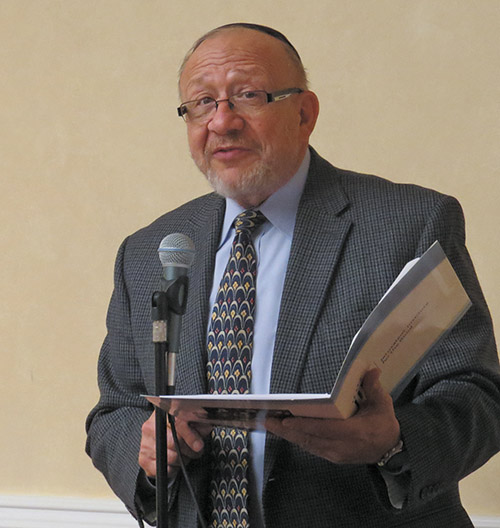



Dining in the dark is not the way most people envision spending their Sunday morning. Yet, for all those that gathered at the Fifth Avenue Synagogue in New York City on May 22, the experience of eating in complete darkness is something that they will never forget.
The Blackout Brunch, which was presented by the Jerusalem Institute for the Blind to benefit the visually impaired in Israel, enabled participants to begin comprehending how individuals who are blind or visually impaired must live their daily lives without the gift of sight.
For over 100 years, the Jerusalem Institute for the Blind has provided a wide array of educational, rehabilitative, health and social welfare activities for blind and visually impaired children and youth throughout Israel.
As the participants gathered in the lobby of the Fifth Avenue Synagogue, each was handed a featherweight blindfold, which they donned before entering the event room. The blindfolded guests were escorted to their tables by Amy Baumgarten and her team from Dark Dining Projects, which worked in conjunction with the Jerusalem Institute for the Blind to produce and manage the Blackout Brunch.
With their world enveloped in total darkness, guests sat in their designated seats, introduced themselves to the people sitting on either side, and attempted to acclimate to an unfamiliar, challenging, yet somehow exciting and even promising black world.
Following introductory remarks by Leo Brandstatter, the Executive Director of JIB’s New York office, the wait staff served a delectable meal to the blindfolded guests. The attendees felt around on the table for the appropriate cutlery, tried identifying the food on their plates by utilizing their senses of smell, taste and touch, and then proceeded to partake in the brunch, slowly and carefully. Throughout the meal, diners conversed with those around them, whom they could hear, but not see. The folks from Dark Dining Projects also led sensory exercises for the attendees during the event, which were intended to highlight the manner in which blind and visually impaired individuals typically perceive and process different experiences.
Rabbi Dr. Wallace Greene, a master educator and a long-time advocate for disabled individuals, was the featured speaker at the event and spoke about a number of Talmudic sages and other famous individuals who achieved greatness without the gift of sight.
“Despite their limitations, blind and partially sighted people are very intelligent and capable,” said Rabbi Dr. Greene. “We know everyday people who did not let their blindness stand in their way. We need to move beyond seeing blind people as needy, toward a view that all people have needs. The blessing of Poke’ach Ivrim is not just about gratitude for our ability to see, but we need to open our eyes and really see and understand how important is the work of the Jerusalem Institute for the Blind.”
Following the Blackout Brunch, some of the attendees reflected on the unique sensory event that they experienced.
“It was magical seeing so much with my eyes covered,” said Leo Brandstatter. “Feeling the touch of apprehension melt away in favor of excitement was an incredible sensation. By experiencing the world in this way, we all gained a fresh perspective on the world of the blind and visually impaired.”
“The Blackout Brunch experience made me especially grateful for the gift of sight,” noted Esther Fishman. “I realized, at the brunch, how much time I normally spend observing my surroundings and people-watching. Had I not been blindfolded, I would have calculated the number of attendees and the dimensions of the room; I would have assessed the average age of the attendees, and I would have analyzed the room decor, among other things. This was truly a wonderful event.”
“Being blindfolded for an extended period of time sensitized me to the strength and indomitability of those who are permanently in the dark,” commented Rabbi Dr. Wallace Greene.
The Jerusalem Institute for the Blind, which was established in the Old City of Jerusalem in 1902 and relocated to its state-of-the-art campus in Kiryat Moshe in 1937, has grown into a widely respected Jerusalem landmark. Today, the Jerusalem Institute for the Blind, which is the first institute of its kind in the Jewish world, serves as a home, school, social outlet, sports center, respite provider, confidence builder and networking enabler for the many blind and visually challenged individuals throughout the Jewish state.
For more information about the Jerusalem Institute for the Blind, visit www.JewishBlind.org or contact Leo Brandstatter at leo.brandstatter@jewishblind.org.
By Aaron Troodler









